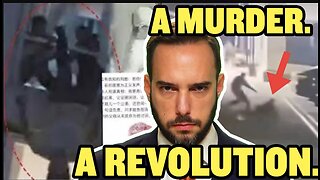Premium Only Content

Walk Away and Economics
A few weeks ago, I caught a YouTube video featuring Brandon Straka from the Walk Away movement, alongside a few allies, engaging with students at a California college. What struck me was the stark display of how deeply many young people have been ensnared by a rigid cultural narrative—one that arms them with manufactured outrage as a tool for intimidation and control. These students, molded by an environment that prizes conformity over curiosity, seem primed to lash out at any deviation, turning campuses into echo chambers where dissent is equated with danger.Yet, beneath this surface of unanimous zeal, I suspect a silent undercurrent exists: countless students who quietly resonate with ideas of independence and open dialogue, much like those championed by Walk Away. They're held back not by conviction, but by a primal fear of reprisal—social isolation, academic penalties, or worse. This isn't mere speculation; it's the natural outcome of a system where individual voices are suppressed in favor of collective dogma, much like how rogue elements in a living system can hijack the whole, forcing compliance to maintain an illusion of unity. The result is a fractured community, where potential for growth and regeneration is stifled, leaving only the dominant strain to proliferate unchecked.Since 2016, the progressive vanguard has revealed itself as unwilling to concede ground gracefully, opting instead for vindictive tactics to silence opposition. They've weaponized their influence to enforce ideological purity, punishing anyone who dares to question the orthodoxy. This punitive streak isn't born of strength but of fragility—a desperate bid to cling to narratives that crumble under scrutiny. Sadly, these fervent enforcers hold sway over key pillars of society: universities, media outlets, and even government bureaucracies. Their grip fosters an atmosphere where truth is secondary to power dynamics, echoing the raw, unvarnished reality that human conflicts often boil down to base instincts of dominance and survival, stripped of poetic illusions.A telling example surfaced in recent congressional hearings involving NPR's leadership, where the executive swiftly retracted long-held stances under pressure, illustrating how these figures bend not to reason or evidence, but to raw authority. It's a reminder that respect in such arenas is reserved for those who wield leverage, not for the principled or the overlooked. In the end, the overlooked—the everyday rebels grinding against the machine—must recognize that endurance comes from embracing the grit of isolation, channeling personal resilience into quiet acts of defiance that erode the facade over time.To counter this, we need to build our own foundations of strength, particularly economic ones, because at their core, all struggles—whether on battlefields or in the realms of ideas—are contests over resources and influence. Culture wars are no exception; they're fought with wallets as much as words. By fostering independent networks, supporting alternative education paths, and investing in enterprises that prioritize freedom over indoctrination, we can reclaim agency. Imagine redirecting funds away from captured institutions toward ventures that nurture diverse thought, much like how adaptive systems evolve by reallocating energy to healthier pathways. Or, drawing from a warrior ethos that defends heritage against erosion, we rally not with aggression, but with unyielding resolve to preserve what truly sustains a society. Ultimately, in the harsh light of experience, victory goes to those who outlast the noise, turning personal hardships into the fuel for lasting change. This isn't about revenge; it's about restoring balance in a world tilted by unchecked zealotry.
-
 40:13
40:13
Clownfish TV
11 hours agoMagic the Gathering Champion BANNED from Tournament Over MAGA Hat?! | Clownfish TV
9.36K19 -
 2:49:47
2:49:47
TimcastIRL
4 hours agoTrump Considers Invoking INSURRECTION ACT To Deploy National Guard to Portland | Timcast IRL
157K80 -
 10:05:38
10:05:38
Dr Disrespect
12 hours ago🔴LIVE - DR DISRESPECT - BLACK OPS 7 - GIVE ME BACK MY NUKE
130K16 -
 LIVE
LIVE
Drew Hernandez
2 hours agoTARGETED LEFTIST TERRORIST ATTACK IN CHICAGO & ISRAEL GEOFENCING U.S. MEGA CHURCHES
935 watching -
 8:58
8:58
Degenerate Jay
13 hours agoXbox Game Pass Is Getting Ridiculous
9.48K -
 7:03
7:03
GBGunsRumble
1 day agoGBGuns Range Report 05OCT25
5.99K2 -
 1:32:30
1:32:30
Glenn Greenwald
9 hours agoWill the War in Gaza Finally End? Flotilla Activists Predictably Abused in Israel's Dungeons; Van Jones' Revealing Joke about "Dead Gazan Babies" | SYSTEM UPDATE #527
90K66 -
 LIVE
LIVE
SpartakusLIVE
5 hours ago#1 King of Content brings MOTIVATION to the MASSES on Monday
496 watching -
 1:48:32
1:48:32
megimu32
4 hours agoON THE SUBJECT: 2000s Hits That Vanished! 🎶
6.91K3 -
 12:19
12:19
China Uncensored
11 hours agoWas This Death China's Turning Point?
11.3K33
